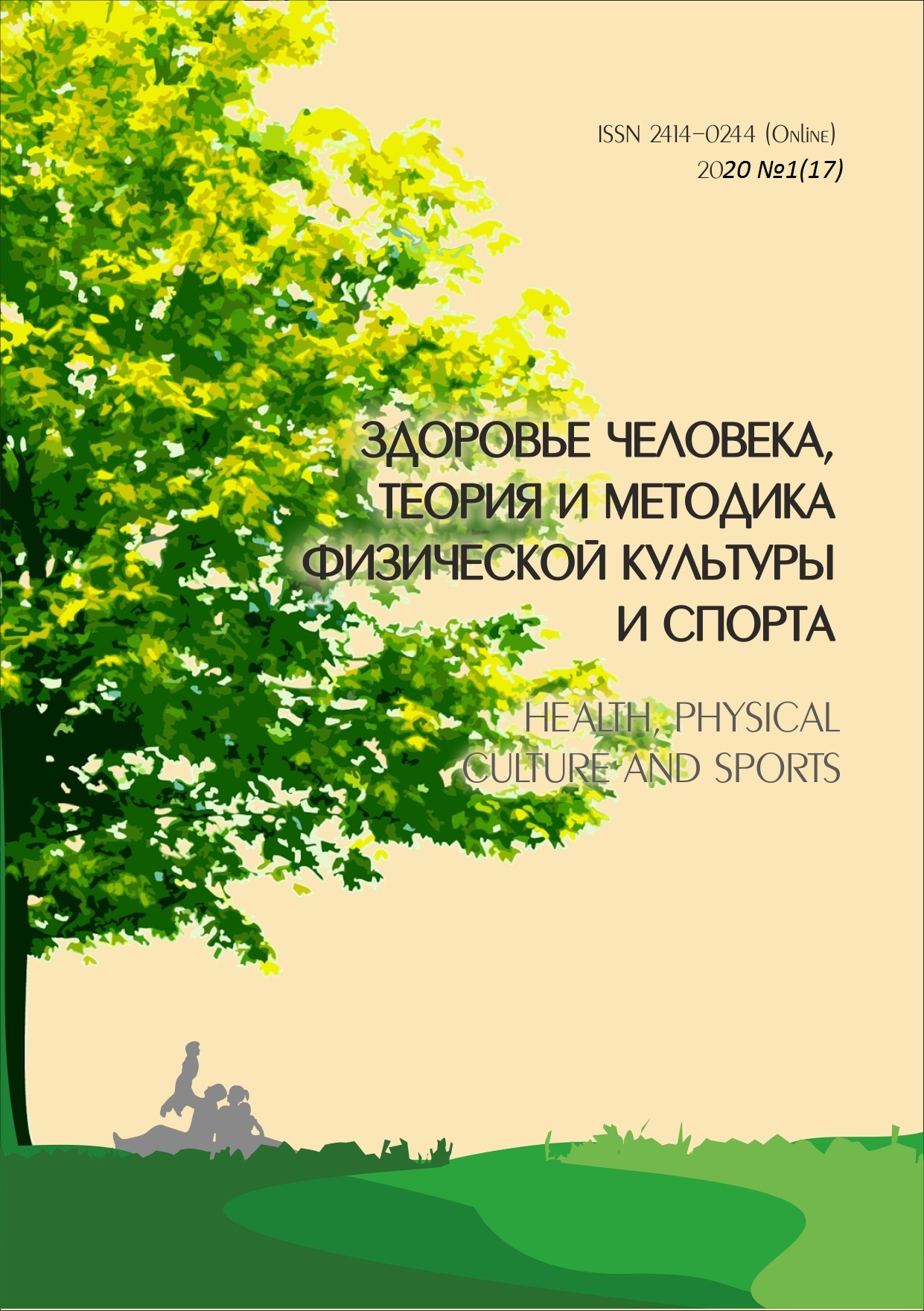ТHE PRINCIPLE OF VARIABILITY IN THE PROCESS OF SKILL FORMATION IN SPORTS
Abstract
An important condition for the rational programming of the training process is the variety (variability) of classes. This provides for the alternation of loads, individual microcycles, various selective orientation, unequal in volume and intensity. Objective: to analyze the features of using the principle of variability in the process of skill formation in sports. Research methods: theoretical – analysis of scientific sources, methods of analogy and comparison, synthesis and generalization; experimental – pedagogical observation. Variability and orientation are observed in the types of training load, depending on the age of the athlete. So, in particular, in practice, after a series of intense trainings, the so-called unloading and recovery microcycles are used. They provide for an increase and decrease in the volume and intensity of the means used, a change in the nature of the exercises. Reducing the training load and switching to the other nature of muscle activity have a certain physiological meaning. It consists in the fact that low-intensity exercises help optimize recovery processes, provide more effective elimination of local and general fatigue: blood circulation in the muscles, tissue metabolism increase, and small loads of a different energy orientation are better used. For the further development of physical culture and sports, training and education of athletes, it is necessary to constantly search for new approaches to the organization of the educational process, taking into account the rapidly changing requirements of sports training.
Downloads
References
Гурьев С.В., Яковлев А.А., Яковлева М.А. Теоретико-методологические аспекты физкультурно-спортивной деятельности // Здоровье человека, теория и методика физической культуры и спорта. 2019. №2 (13). С. 152–163 . URL: http://journal.asu.ru/index.php/zosh.
Белоуско Д.В. Делегирование индивидуализирующих функций обучающемуся в контексте зеркальной индивидуализации // Здоровье человека, теория и методика физической культуры и спорта. 2019. №2(13). С. 20–29 . URL: http://journal.asu.ru/index.php/zosh.
Гурьев С.В. Проблема социальных способов воздействия на организацию рационального режима труда и отдыха студентов // Здоровье человека, теория и методика физической культуры и спорта. 2019. №1(12). С. 65–78. URL: http://journal.asu.ru/index.php/zosh.
Агишев А.А., Фатеев И.С. Корреляция мощности и уровня гемоглобина для формирования спортивного результата // Здоровье человека, теория и методика физической культуры и спорта. 2019. №2 (13). С. 164–181. URL: http://journal.asu.ru/index.php/zosh.
Матвеев, Л. П. Общая теория спорта и ее прикладные аспекты : учеб. пособие [Текст] / Л. П. Матвеев. М. : АСТ, 2015. 175 с.
Решетников Н.В., Кислицын Ю.Л. , Палтиевич Р.Л., Погадаев Г.И. Физическая культура : учебник. М., 2013. 176 c.
Туманян Г.С., Гожин В.В. , Микрюков В.Ю. Теория, методика, организация тренировочной, внетренировочной и соревновательной деятельности : учебное пособие. М., 2002. 250 с.
Платонов В.Н. Подготовка квалифицированных спортсменов. М., 1986. 287 с.
Кузнецов В. С. Теория и методика физической культуры : учебник. М., 2012. 416 с.
Фомин Н.А., Филин В.П. На пути к спортивному мастерству. М., 1986. 160 с.
REFERENCES
Gur'ev S.V. (2019). Pedagogicheskie aspekty formirovaniya ozdorovitel'noj fizicheskoj kul'tury v vuze. Health, Physical Culture and Sports, 2 (13), 30–40. Available from: URL: http://journal.asu.ru/index.php/zosh. (Accessed on: 14.11.2019) (in Russian).
Gur'ev S.V., Yakovlev A.A., Yakovleva M.A. (2019). Teoretiko-metodologicheskie aspekty fizkul'turno-sportivnoj deyatel'nosti. Health, Physical Culture and Sports, 2 (13), 152–163. Available from: URL: http://journal.asu.ru/index.php/zosh. (Accessed on: 14.11.2019) (in Russian).
Belousko D.V. (2019). Delegirovanie individualiziruyushchih funkcij obuchayushchemusya v kontekste zerkal'noj individualizacii. Health, Physical Culture and Sports, 2(13), 20–29. Available from: URL: http://journal.asu.ru/index.php/zosh. (Accessed on: 14.11.2019) (in Russian).
Gur'ev S.V. (2019). Problema social'nyh sposobov vozdejstviya na organizaciyu racional'nogo rezhima truda i otdyha studentov. Health, Physical Culture and Sports, 1(12), 65–78. Available from: URL: http://journal.asu.ru/index.php/zosh. (Accessed on: 14.12.2019) (in Russian).
Agishev A.A., Fateev I.S. (2019). Korrelyaciya moshchnosti i urovnya gemoglobina dlya formirovaniya sportivnogo rezul'tata Health, Physical Culture and Sports, 2 (13), 164–181. Available from: URL: http://journal.asu.ru/index.php/zosh. (Accessed on: 14.12.2019) (in Russian).
Matveev L.P. Obshchaya teoriya sporta i ee prikladnye aspekty : ucheb. posobie. Moscow, 2015. 175 s. (in Russian).
Reshetnikov N.V., Kislicyn Yu.L. , Paltievich R.L., Pogadaev G.I. Fizicheskaya kul'tura : uchebnik. Moscow, 2013. 176 s. (in Russian).
Tumanyan G.S., Gozhin V.V., Mikryukov V.Yu. Teoriya, metodika, organizaciya trenirovochnoj, vnetrenirovochnoj i sorevnovatel'noj deyatel'nosti : uchebnoe posobie. Moscow, 2002. 250 s. (in Russian).
Platonov V.N. Podgotovka kvalificirovannyh sportsmenov. Moscow, 1986. 287 s. (in Russian).
Kuznecov V. S. Teoriya i metodika fizicheskoj kul'tury : uchebnik. Moscow, 2012. 416 s. (in Russian).
Fomin N.A., Filin V.P. Na puti k sportivnomu masterstvu. Moscow, 1986. 160 s. (in Russian).

This work is licensed under a Creative Commons Attribution-NonCommercial 4.0 International License.
An author should not normally publish manuscripts describing essentially the same research in multiple journals or publication venues. Such redundant publication is generally considered to constitute unethical publishing behavior, and if discovered may result in a manuscript under consideration being rejected, or a published article being retracted.
Authors of manuscripts reporting on original research should present an accurate account of the work performed, accompanied by an objective discussion of its significance. Underlying data should be represented accurately in the manuscript. The manuscript should contain sufficient detail and references to permit others to replicate the work. The fabrication of results and the making of fraudulent or knowingly inaccurate statements constitute unethical behavior and may be cause for rejection or retraction of a manuscript or published article.





